Fun Disaster Education Programs: Designed in Japan, Shared with the World
Hirokazu Nagata (Chairperson, Plus Arts NPO)
The Japan Foundation awards the Japan Foundation Prizes for Global Citizenship to organizations that endeavor to strengthen networks and collaboration among citizens both inside and outside Japan, and mutually share knowledge, ideas, and expertise through intercultural exchange. In 2014, on the 30th year of the prizes, the Prizes for Global Citizenship were awarded to three organizations: Plus Arts; AmerAsian School in Okinawa; and the Nara International Film Festival Organizing Committee. Plus Arts has raised disaster awareness around the world from Japan by developing disaster education programs which incorporate attractive designs and fun games to make them accessible to everyone. Plus Arts was recognized as a model program for deepening networks and mutual understanding among citizens inside and outside Japan based on the common global theme of disaster risk reduction.
On the tenth anniversary of the Great Hanshin-Awaji Earthquake (a.k.a. the Kobe Earthquake), a disaster preparedness program was developed at the request of Hyogo Prefecture and Kobe City. The program was designed as a new type of disaster drill program to allow families with young children to learn about disaster preparedness while having fun at the same time. Then Plus Arts renamed the program to "Iza! Kaeru Caravan!" to scale it up from Kobe to other regions. A decade has passed since then, and as of late 2014, "Iza! Kaeru Caravan!" has been conducted over 200 times in 21 prefectures in Japan. In addition, Plus Arts' overseas program, which began in Indonesia in 2007, has been held in 14 countries.
The overseas project conducted in partnership with the Japan International Cooperation Agency (JICA) and the Japan Foundation has been held in more countries in recent years, including Indonesia, Thailand, and the Philippines. This project, through collaboration with passionate and dedicated local staff members, has delivered significant outcomes.
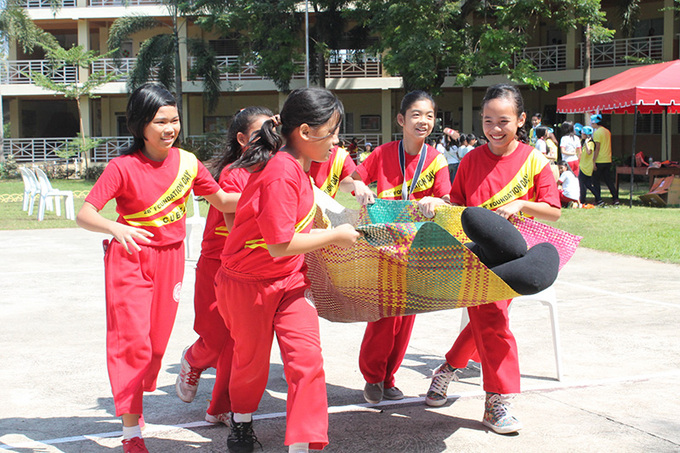
Drill on transporting an injured person using a banig (mat) at "MOVE PHILIPPINES," the Philippines version of Kaeru Caravan
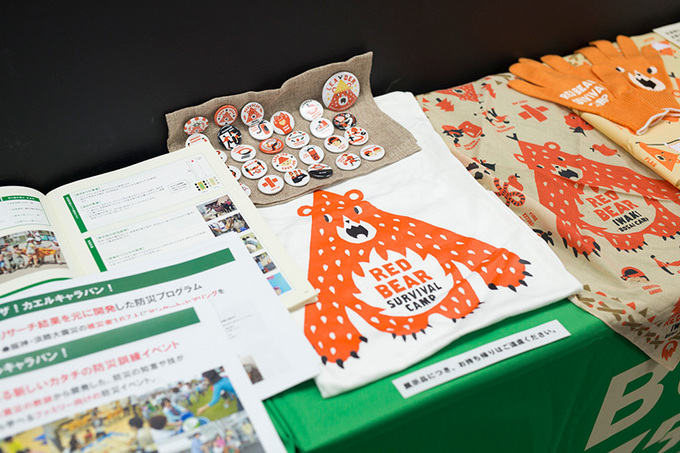
Button badges, t-shirt, work gloves, and other items from the "Red Bear Survival Camp" workshop to equip people with survival techniques useful in times of disaster
Plus Arts' philosophy for international support projects is "the story of wind, water, and soil." Let me further elaborate. International support projects involve three types of people: "wind people, water people, and soil people." The concept is that each type of person has to fulfill their respective role. "Soil people" refer to people who are settled in the community, i.e., the local residents. In the olden days, "soil people" were able to hold successful community activities singlehandedly. In today's era, however, the sense of community has dissipated, and social issues, including disaster risk reduction, have become increasingly complex. "Soil people" alone can no longer solve these issues, creating a sense of stagnation. Under these circumstances, "wind people" bring "seeds," or activities or events, to give communities an impetus to act. We at Plus Arts consistently strive to become the ultimate "wind people." Every day, we develop attractive programs that promote wide-ranging participation. We direct our creative energies into projects that assemble people in the community by making them want to take part in the projects. These people who assemble are able to participate and join the projects' creation process, and in turn, the people take ownership of the projects. But because we are "wind people," we must eventually leave the community. That is when "water people" come into play. They are intermediaries in the community who water the seeds in an appropriate way.
"Water people" include people from a broad variety of backgrounds, including passionate local government officials, university professors, and women who are active in the community and know it inside out. In our overseas disaster education project that I introduced earlier, the local staff members of the Japan Foundation serve as our indispensable partners as special "water people." Through collaboration with these outstanding partners, we have learned so much and have been able to produce significant achievements that we could not have attained on our own. We will continue to draw on and further enhance the knowhow we have cultivated with the Japan Foundation and contribute to elevating the disaster preparedness of people around the world.
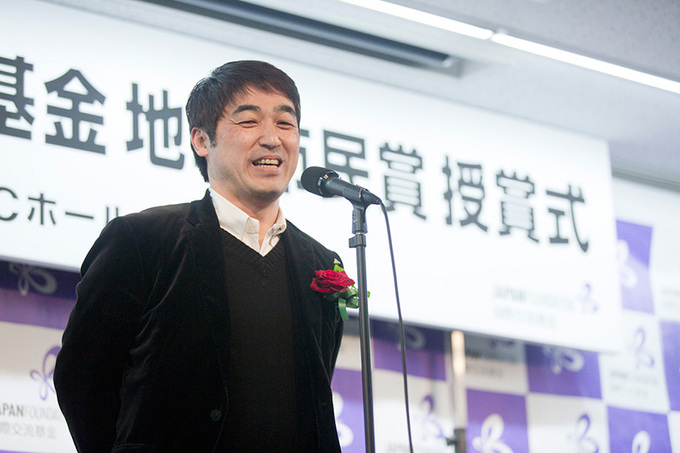
Mr. Hirokazu Nagata, Chairperson of Plus Arts, delivering his acceptance speech
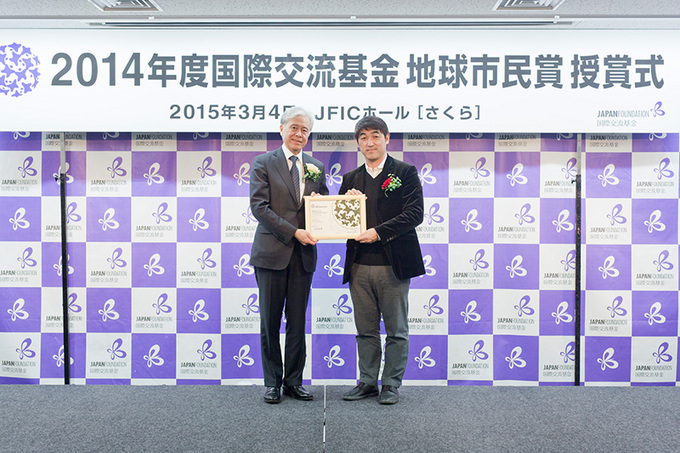
Mr. Hirokazu Nagata accepting the award certificate from the Japan Foundation President Hiroyasu Ando
Lastly, I would like to share with you wisdom that will immediately come in handy in the event of a disaster.
That is to carry this disaster preparedness item: a large-sized handkerchief. A large handkerchief with dimensions of about 50cm by 50cm can go a long way. You can tie it around your injury to stop the bleeding, or tie it behind your head and use it as a mask to protect your throat from dust. It will truly come in handy if a disaster were to strike and you have it with you. I highly encourage everyone to carry one with them at all times.
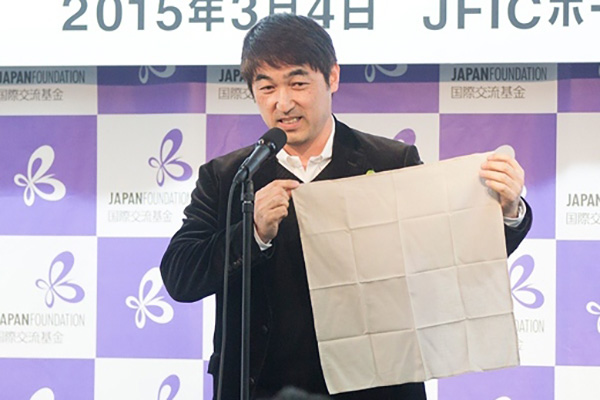
Mr. Hirokazu Nagata pulling out a large-sized handkerchief during his acceptance speech to share his wisdom on handy disaster preparedness
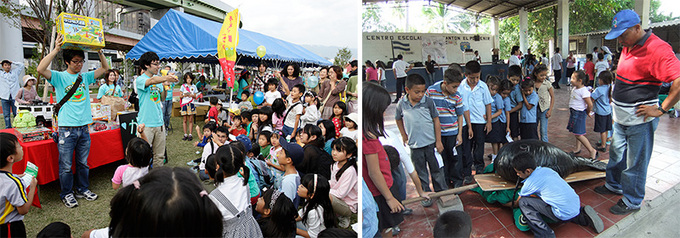
Left: Iza! Kaeru Caravan! (at Iza! Kaeru World! in Kobe) attended by many parents and children
Right: Drill on rescuing a person trapped under a house by applying the "principle of leverage" in El Salvador
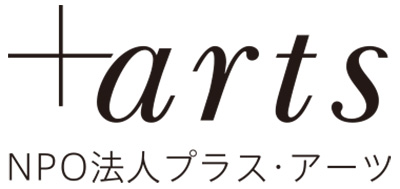
Learning from the lessons of the Great Hanshin-Awaji Earthquake, Plus Arts formulates the "Have Fun while Learning about Disasters" program that utilizes design and art, and carries out promotional activities through workshops and exhibitions held domestically and abroad. In cooperation with overseas partners, it implements programs that are flexibly adapted to local needs, so that disaster education originating in Japan is also widely received overseas. It has improved the level of disaster awareness in many parts of the world.
Back Issues
- 2019.8. 6 Unraveling the Maker…
- 2018.8.30 Japanese Photography…
- 2017.6.19 Speaking of Soseki 1…
- 2017.4.12 Singing the Twilight…
- 2016.11. 1 Poetry? In Postwar J…
- 2016.7.29 The New Generation o…
- 2016.4.14 Pondering "Revitaliz…
- 2016.1.25 The Style of East As…
- 2015.9.30 Anime as (Particular…
- 2015.9. 1 The Return of a Chin…

